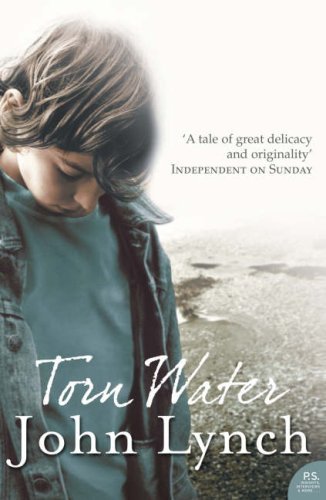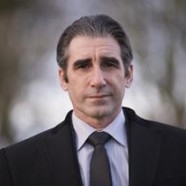life is an ‘as if’ matter

Border. Edges. Limits. The inside and the outside. This place here and that place there, beyond the boundaries. Fantasies and visions about death; and the final disclosure of life.
The ‘fatherland’ gone missing, and the ‘motherland’ which
needs our blood to breathe.
Violence, conflict, heroism, dependency, a kind of femininity capable to devastate and break to pieces every single thing it crashes into; but also a different sort of femininity which gives back to the boy the male who is already hiding inside him.
And a language which is in awe of absolutely nothing: neither to taste as sweet as honey nor to linger on your skin as slow as a voluptuous caresse; nor to touch the carnal blasphemy of a
He looks like a drunken Christ.
Torn Water is the first of the two novels written so far by John Lynch, an actor from Northern Ireland (half-Italian, actually) living in France; he was in the cast of Sliding Doors and In the Name of the Father, to mention just a couple of the films he took part in.
His second book – maybe richer and more solid, stronger and in a way more opalescent – is titled Falling out of Heaven, and tells the wonderful – hard and soft – story of a man who has such a huge number of things to say and show that as a reader I found myself crushed, enthralled, subjugated, enraptured, completely drawn away. No way of coming back to myself. No way of getting rid of the flavour I tasted.
Torn Water is a Bildungsroman, yes; but there is much and much more to it.
It certainly traces the passage of the seventeen year-old boy James Lavery (oh, the same initials as the author himself!) from being a son to being a man, but it slides through two ‘funnels’ that lead him to the warm discovering of his human nature rather than his adulthood.
The first ‘bottleneck’ is nested in the plot: it is about the discomforting matter of fact that each of us is a victim in their way, but this is not good enough a reason for absolving us of any faults.
Even the obnoxious would-be stepfather Sully, who treasures in his pocket a portrait of the young James, is a victim: you can see it in his holding that photo. James is struck by this revelation, but he will say in the end:
Everyone has a photo of someone, don’t they? It’s easier to look at a photo. A photo will never let you down or tell you that it hates you.
As for the second ‘funnel,’ it is disclosed by the language, full of ‘as if-s’.
They are not ornamental metaphors – some of which bright and sensational, like that of the giant rising from the depth of the sea only to be seen by the eyes of the two young lovers; some maybe a bit debased by their common usage in everyday life. But in any case they are absolutely pivotal as well as necessary.
Because life is all about its as if-s.
Paradoxically, it is exactly in its looking like something else that life cherishes it deepest truth. There is no such thing as a life apart from that you experience through the echoes of something else that life itself let resonate in your feelings, senses and body.
While his stepfather tells him, with both dull and unaware cruelty, about the suicide attempted by his mother, James doesn’t feel anything at all:
He is divorced from what is happening, as if he wandered into someone else’s family.
This means that you will find the deepest truth of life in your own ‘estrangement,’ in the act of ‘de-localising’ yourself. Because life exists inasmuch as it elicits something else; insofar as it tells you about something different from what you can see with your eyes; to such an extent that it tells you about things you are feeling.
And you can feel things only as if they were an as-if-matter, since they can’t offer any tangibility nor evidence.
Life is that as-if matter which James finds out in dramas his teacher pushes him to act; in his becoming as if he was Errol Flynn or Al Pacino.
Attempting to her own life, his mother Ann (whose right of having a name James accepts to acknowledge only after 25 pages) finally gives James the chance to contact another kind of femininity which – light, sensuous and brave as it appears to be – takes the maleness out of him.
He now sees there was no room in her heart [that of his mother] for him.
Such a liberating revelation.
Now also his father is allowed – and supposed! – to do something to set James free: he must go straight away, stop occupying everyone’s memories, for good.
Here and there, through the pages of a novel that brings to light not a mere writer but a man-who-writes, you happen to find the finest pearls and diamonds a book can display.
The scene with the lorry driver, for instance.
James often goes to the border between the North and the South. He looks at lorry drivers. One day he askes one of them for a lift to Dublin.
The man, showing an animal gift of grasping any signs no matter how undetectable, comes out with this question, out of the blue:
Dublin no less. Is she pretty?
Or the scene in which aunt Teezy takes James to his father’s grave:
Teezy is carrying a red rose that she bought earlier in the centre of the town. James had watched as she fussed over which to buy, eventually choosing one, saying, ‘This one has a bit of life in it yet.’
A bit of life in something dead she bought for a dead.
Another as-if matter, that «bit of life»…
*** *** ***
Border. Edges. I confini. Il dentro e il fuori. Il di qua e il di là. Le fantasie di morte e la scoperta della vita. La «padre-patria» che non c’è, e la madre-patria Irlanda «che ha bisogno del nostro sangue per respirare». La violenza, il conflitto, l’eroismo, la dipendenza, il femminile che devasta e il femminile che restituisce al ragazzo il maschio che ci si nasconde.
E una lingua che non ha paura di niente: né di essere dolce come il miele o languida come una lenta carezza, né di toccare, senza baldanza, il blasfemo di un «sembrava un Cristo ubriaco».
Torn Water è il primo dei due romanzi che finora ha scritto John Lynch, attore nordirlandese – ma mezzo italiano e ora residente in Francia – che ha recitato anche in Sliding Doors e in Nel nome del padre.
L’altro libro, più solido e ricco, più forte e luminoso, è Falling out of Heaven, ed è la meravigliosa durissima e morbida storia di un uomo che ha così tante cose da dire che se ne rimane schiacciati, affascinati, rapiti, definitivamente sedotti.
Torn Water un romanzo di formazione – sì – ma non solo.
Registra – sì – il passaggio del diciassettenne James Lavery (e guarda un po’: le iniziali sono le stesse dell’autore) dalla qualità di figlio alla qualità di uomo, ma passa per due strettoie che si legano più alla calda scoperta dell’«umanità» che alla conquista della «uomità».
La prima è rivelata dalla trama, ed è che tutti siamo vittime, ma questo non basta a mandarci assolti.
È vittima perfino il detestato aspirante patrigno Sully, che si porta in tasca una foto di James ragazzino. James rimane colpito, ma alla fine dirà: «Chiunque ha una foto di qualcuno, no? È più facile guardare una foto. Una foto non ti delude né ti dice che ti odia».
La seconda è rivelata dalla lingua, piena di «as if», di «come se».
E sono metafore – alcune splendenti e sensazionali come quel gigante che si alza dalle profondità del mare solo ed esclusivamente per gli occhi di due ragazzini innamorati, altre più fruste e svilite dall’uso comune – completamente necessarie. Non decorative.
Perché la vita è contenuta nel «come se», e – paradossalmente – è in questo suo somigliare a qualcos’altro che c’è la sua verità più profonda.
Al di fuori degli echi che la vita muove nelle nostre emozioni, nei nostri sentimenti, nei nostri sensi e nei nostri corpi, non c’è niente che possa definirsi vita.
Mentre il patrigno gli racconta con desolata e incolpevole crudeltà del tentativo di suicidio della madre, James non prova niente; dice di essere «diviso da quel che accadeva, come se stesse vagabondando nella famiglia di qualcun altro».
La più grande verità, insomma, è nello straniamento, nella «delocalizzazione» di sé; perché la vita è in quanto evoca, in quanto parla d’altro da quel che vedi. In quanto parla di quel che senti. E quel che senti è necessariamente un «come se», perché non ha materia né evidenza da mostrarti.
La vita è quel «come se» che James scopre nella recitazione a cui lo spinge il professore, nel sentirsi Errol Flynn o Al Pacino.
Tentando di uccidersi, la madre Ann – a cui Lynch riconosce il diritto al nome dopo 25 pagine – libera per James la possibilità di vivere il contatto con un’altra femminilità che, leggera, sensuale e coraggiosa, lo rende maschio. E anche il padre morto può e deve fare qualcosa per liberare James: deve andarsene, deve smetterla di occupare la memoria di tutti.
E qua e là, fra le pagine di un romanzo che consegna a chi legge non uno scrittore, ma un uomo scrittore, perle e diamanti.
Come nella scena del camionista.
James va spesso alla frontiera fra l’Ulster e l’Eire. Va a guardare i camionisti. Un giorno chiede a uno di loro un passaggio fino a Dublino.
E quello, con belluina intuizione e totale aderenza alla terra, gli dice «Dublino. Nientemeno. Ma lei è carina?».
O come quando la zia Teezy lo accompagna alla tomba del padre.
«Teezy porta con sé una rosa rossa che aveva comprato poco prima in centro. James l’aveva guardata affannarsi concitatamente nella scelta e decidere finalmente di prenderne una dicendo “sì, a questa è rimasto ancora dentro un frammento di vita”».







 Scrittrice e giornalista, ho lavorato per oltre vent'anni nei quotidiani, dimettendomi in agosto 2012 da un contratto a tempo indeterminato.
Ho scritto il noir
Scrittrice e giornalista, ho lavorato per oltre vent'anni nei quotidiani, dimettendomi in agosto 2012 da un contratto a tempo indeterminato.
Ho scritto il noir 

